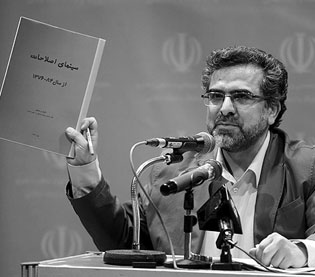|
Cinema Policy Book:
Flashback
by Mehrzad Danesh
|

Deputy Minister of Culture and Islamic Guidance for cinema, Javad Shamaqdari, introduced Iranian cinema's new horizons for a year at a press conference on 19 April. This was the first official declaration of Iran’s cinema policies since President Mahmoud Ahmadinejad took office for the second time in June 2009. During the president's first term in office Shamaqdari was his adviser on artistic affairs and a critic of the government's cinema policy. Many have been waiting to see changes he was going to bring about since he has been appointed deputy culture minister for cinema in the new administration.
Some of those changes have already emerged during the seven months that Shamaqdari and his aides have been in charge. One of the most important of those changes has been lifting of the ban imposed on the screening of a number of movies including Payback and Book of Law, which had been banned under the previous Ahmadinejad administration, in addition to Colored in Purple, which was banned under Khatami, and The Fifth Rider of Fate, which was banned in the 1980s. One of the newly released films is Poet of the Wastes with a screenplay by Mohsen Makhmalbaf, a filmmaker who took positions against the Islamic Republic during post-election unrests. Some observers say by doing so, the government has been bribing artists many of whom did not support Ahmadinejad in the presidential election in June 2009. On the other hand, some Islamist conservatives have branded this policy as liberal and condemned them. Mashhad Friday prayers leader, Ahmad Alamolhoda, was one of them. He said lifting the ban on these films was a counter revolutionary and un-Islamic measure. However, Shamaqdari and Minister of Culture, Hosseini, responded to critics by defending their actions. Shamaqdari said at 19 April press conference: “It has been said that lifting the ban on some movies has been the only achievement of the deputy minister of culture for cinema. This is not fair. This has been merely a measure to correct some wrong expert views.” Shamaqdari attributed most problems of the Iranian cinema to eight years when reformists were in charge of the government: “It is fashionable these days to picture the Iranian cinema in the quagmire of corruption. They put forward this idea in a way as if this situation was created by the new management. Cinema was pushed deliberately towards vulgarism for eight years under the reformists and unintentionally for four more years under the first Ahmadinejad administration. And we have been silent during that period. It is fair for us to criticize the past. I take pride in not having made a single movie during the past 12 years.” He added: “There is no such thing as banned movie. Experts express their views on movies and their views must be discussed. Iranian filmmakers do not plan to make films that would end up in ban. A director may have made a mistake. This does not mean that his or her film should be banned.” Incidentally, under the new administration, a few films were banned from public screens. Reward by Kamal Tabrizi is one of them. It is a comedy about Hajj pilgrimage of a state official. What makes the administration's decisions in this respect more ambiguous is the opposition to send some authorized movies abroad to take part in international film festivals or for public screening there. State managers of cinema believe that films that show a gloomy critical image of Iran should not be screened abroad. Nothing (Abdolreza Kahani) and Book of Law (Maziyar Miri) are two of these films....
[Page: 30]
|
|
|
|
|
President & Publisher
Massoud Mehrabi
Editors:
Sohrab Soori
Translators:
Sohrab Soori
Behrouz Tourani
Zohreh Khatibi
Contributors
Saeed Ghotbizadeh
Mehrzad Danesh
Advertisements
Mohammad Mohammadian
Art Director
Babak Kassiri
Ad Designers
Amir Kheirandish
Hossein Kheirandish
Cover Design
Alireza Amakchi
Correspondents
E.Emrani & M. Behraznia (Germany)
Mohammad Haghighat (France)
A. Movahed & M. Amini (Italy)
Robert Richter (Switzerland)
F. Shafaghi (Canada)
B. Pakzad (UAE)
H. Rasti (Japan)
Print Supervisors
Shad-Rang
Noghreh-Abi
Gol-Naghsh
Subscription & Advertising Sales
Address: 10, Sam St., Hafez Ave., TEHRAN, IRAN
Phone: +98 21 66722444
Fax: +98 21 66718871
info@film-magazine.com
Copyright: Film International
© All rights reserved,
2023, Film International
Quarterly Magazine (ISSN 1021-6510)
Editorial Office: 5th Floor, No. 12
Sam St., Hafez Ave., Tehran 11389, Iran
Printed in Tehran
Publishing Date Spring 2010
*
All articles represent views of their
authors and not necessarily
those of the editors
|
|
|

